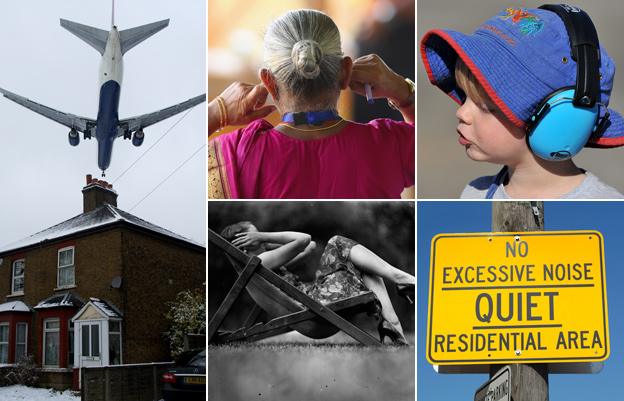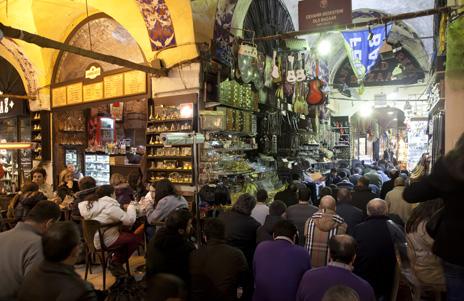The dark side of silence
- Published

Everybody wants to be able to have a little bit of peace and quiet. But the battle to get other people to keep the noise down can have unfortunate consequences, writes David Hendy.
Two months ago, I found myself standing at a busy road junction in Ghana's capital, Accra.
Surrounded on all sides by cars, taxis, lorries, and loudspeakers blasting out advertising slogans, I could barely hear myself think. It's certainly hard to dispute that the world is getting noisier.
More traffic, more machinery, more people, more of everything - all producing a rising arc of cacophony.
The question is, what do we do about it?
One response would be simply to flee the din altogether. Another, to block it out with technology - or even silence it at source.
Yet we've tried all these strategies for centuries. And history warns us that the most obvious solutions aren't always the best. Seeking silence usually comes at a high price.
In ancient Rome, a city of a million people living cheek-by-jowl, delivery carts would trundle along the narrow stone streets all night long. Gyms, bars, brothels - all stayed open into the small hours. Inevitably, sleep was a rare commodity.
Rome's elite fled to calm oases such as the Palatine Hill, where they'd only be disturbed by a few footsteps on marble and the trickle of ornamental water. That did little for those stuck in the teeming apartment blocks below.
In Elizabethan Oxford, there were constant complaints about late-night revellers spilling out of alehouses and disturbing the peace, which drove the better off to retreat to their stately homes.
There, they muffled the surrounding din by insulating themselves with the thickest walls they could afford and the latest fashion in lush drapes or curtains. Back in the city, the revelling carried on.
Two centuries later in Edinburgh, where privacy and peace were entirely absent in the crowded tenements of the Old Town, polite society decided the only hope was to create for itself a whole "New Town" so that respectable families could retreat behind their own impressively solid front doors.
That was fine for them. But in the Old Town, of course, life simply got worse.
As for Victorian London, its cobbled streets were in ceaseless uproar with the clatter from the iron-rimmed wheels of carriages rushing about, and the thousands of tuneless street musicians who tormented residents such as Charles Dickens.
"Brazen performers on brazen instruments, beaters of drums, grinders of organs… and bellowers of ballads" he called them. The most extreme response came from the writer Thomas Carlyle, who, nearly driven out of his mind, spent a fortune building a state-of-the-art "soundproof study" in his Chelsea attic.
Carlyle's new room was a disaster. Set against the overall hush, the slightest sound now stood out.
Seeing him so "out of sorts", his wife Jane declared it "the noisiest in the house". It certainly showed no signs of ending Thomas's torment, for he continued for years to rail against the street musicians, the neighbours' crowing cockerels, or passing dust-carts.
Acoustic experts explain how London streets amplify the city's cacophony
The unpalatable truth, then as now, is that while noise and frayed nerves go together it's often difficult to tell which is cause and which is effect.
"You can imagine a motto inscribed over the door," the American author Garret Keizer once wrote after visiting Carlyle's house. "To be obsessed with quiet is never to be possessed of it."
Today, those who live in a Brazilian favela or who work in the market places of Istanbul claim they're indifferent to the noise around them - indeed that they embrace it.
It's the vivid sound of human life, of neighbourliness, a comforting backdrop that ceaselessly confirms one isn't horribly alone. We should perhaps try a little harder to follow their example. But what makes it bearable for them is that their soundscape is something generated by - and so something owned by - everyone.

Usually these days noise is more unequally distributed. And that's where the trouble starts.
Jet off to India, or certain American states, and you can stay among monks who've taken a vow of silence. It's a growing business. But of course to get there you'll have made your own small contribution to shattering the quiet of anyone living below the flight path. You'll merely have shifted noise out of your own life and into someone else's.
This, of course, is something those living near airports know all too well. The residents who've been campaigning in Britain against a third runway at Heathrow - like those who've objected to the HS2 high-speed rail link - are understandably completely opposed to the prospect of more noise disturbing their peace and quiet.
But their distress and anger is all the more intense because they also sense their own lack of "voice" in the decision-making process. In the face of some abstract commercial or national "interest", they have been, well, silenced.

Throughout history, silencing is something the powerful have tended to do to the weak. It's taken many subtle forms. And it can have lasting effects. One 17th Century English manual taught teenage girls how to behave in the presence of adults.
"Do not speak unless you are asked a question," it urged. "Be silent, contenting yourself to be an attentive hearer… Maids should be seen, not heard." It's not hard to catch similar sentiments expressed even today, especially about the boisterous young.
But shutting our ears to what's especially uncomfortable to behold has almost always led to a dangerous form of social deafness.
Not only have we become hypersensitive to whatever sounds remain - we've also become estranged from the people who make them. Certain kinds of music or ways of talking become steadily less familiar - they become alien, even threatening.
Among 17th Century colonists in New England it applied to the "savage" sounds of the Native Americans. Today, many of us apply it to rap music.
What might have meaning or value becomes, to our own impatient ears, just "noise". And that's when, instead of struggling to find some means of co-existence, we try to silence it or ignore it.
One reason night-time deliveries were allowed to disturb the sleep of ordinary Roman citizens is simply that the city's law-makers, safely cocooned in their Palatine palaces, had no experience of living in such bleak circumstances themselves.
In the early years of the 20th century, by way of contrast, New York had one of the most vigorous Noise Abatement campaigns in the world. But even that didn't help.
In some parts of the city, hawkers, newspaper delivery boys, roller-skaters, even those who carelessly kicked a tin can down the street were targeted.
All of this meant the streets quickly became arteries of fast-flowing traffic rather than places of sociable human interaction.
It was the relentless drone of motor-cars and lorries that came top of the list of complaints among ordinary New Yorkers. But their voice hadn't been heard - it was the city's Great and Good who'd led the noise abatement campaign.
Class prejudice has long had a nasty habit of making us attack the wrong targets.
The lesson from history, it seems, is this - when it comes to noise, be careful what you wish for.
The 30-part series Noise: A Human History is on BBC Radio 4 weekdays at 13:45 GMT, or catch up with iPlayer
You can follow the Magazine on Twitter, external and on Facebook, external